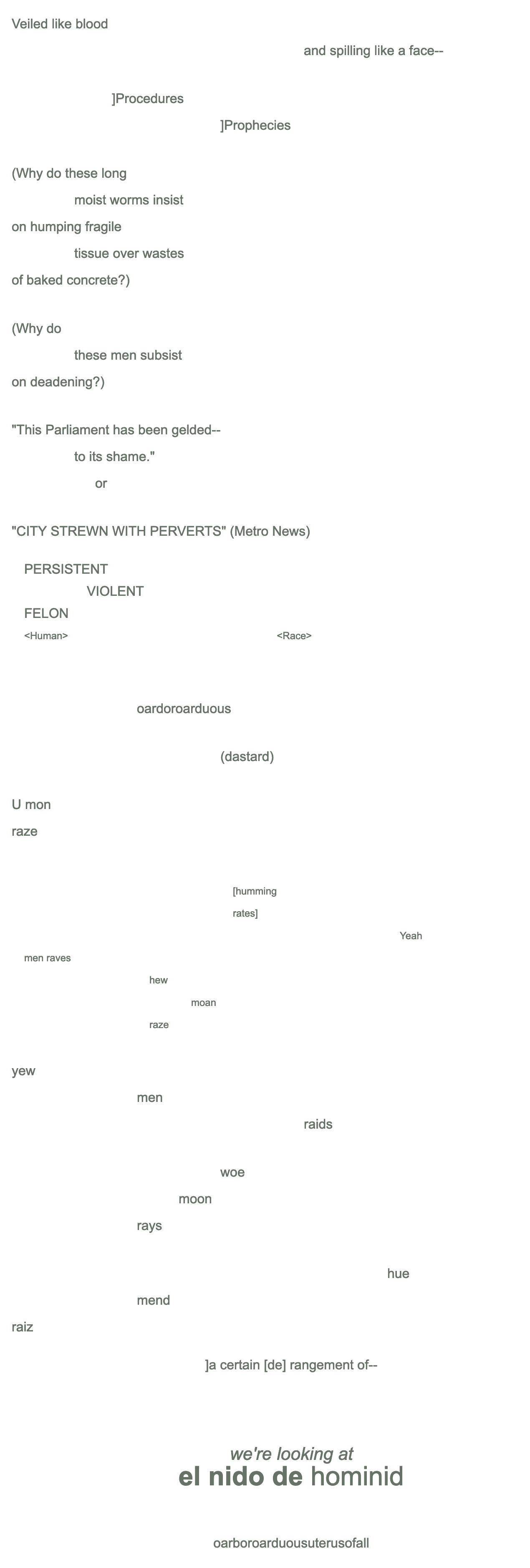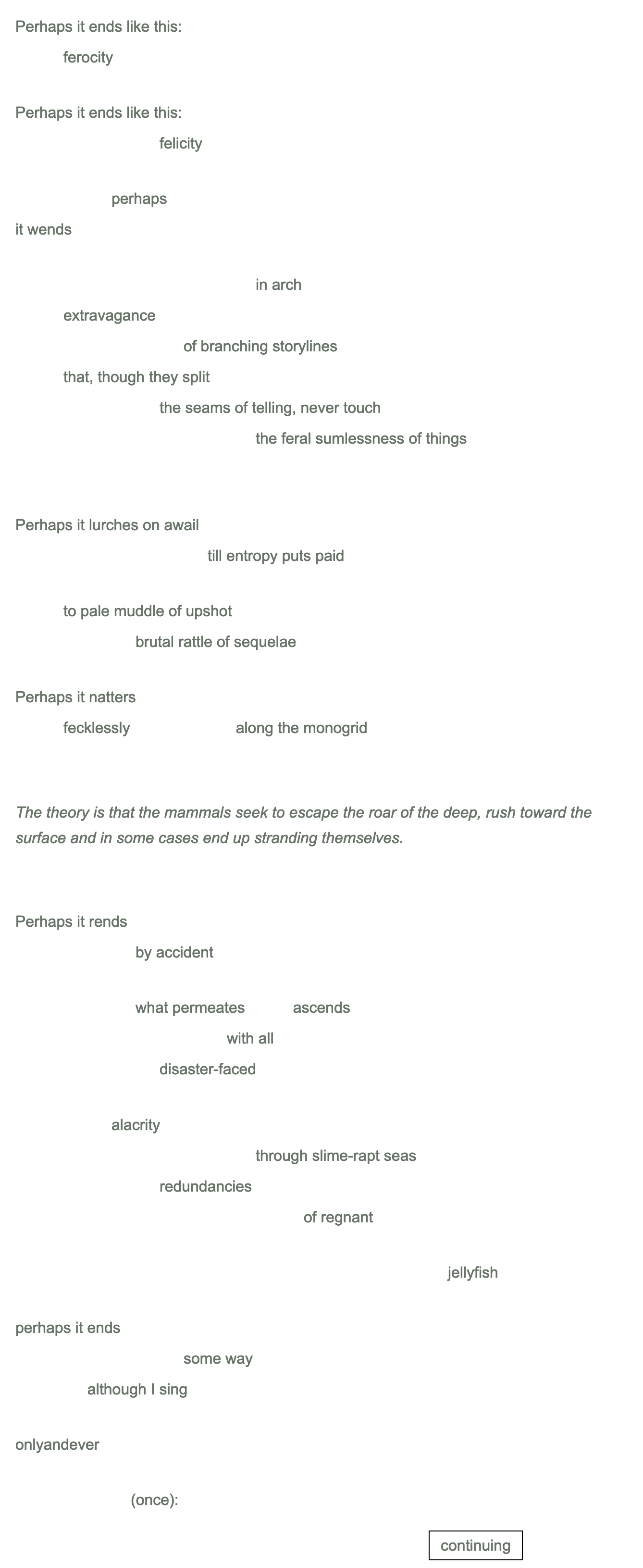How can one see all the ants on the planet
when one is wearing the blinders of narrative?–Janet Malcolm
1. Months without ants.
Then–ants!
2. The great burdock leaves
in the many days’ rain
3. The artificial trickle
of my neighbor’s water feature
4. You mow the grass, New England, so neatly between graves
but let the headstones lean
5. Larvatus prodeo: Nice work if you can get it.
(“I advance, pointing to my mask”)
6. I would like
lifting now
7. But I withdraw,
pointing to my corset
8. Or retreat into form: the thing that is experienced by the novice
as a sacrifice of possibilities
9. I’m wearing the mask of a man
and a veil to boot
10. The bearer of ambition,
I flicker in the shade
11. Went out on a limb (“America”) with people
who think it’s normal to be a family
12. Where sea lions loll, amusingly hauled out
on navigation aids
13. Where silky sisters draw their shining houses
around their shoulders, shawl-like
14. Remember whalebone stays?
Pantyhose?
15. COLOQUE TODOS LOS ABRIGOS, CHAQUETAS, Y BLAZERS
EN LOS CONTENEDORES TSA
16. “Another opt out, gimme
a female assist–“
17. Think not that I am come
to send peace on earth:
18. Here I am,
getting patted down again
19. I’d found a way to be a woman,
wound in language like graveclothes
20. I came not to send
peace, but a sword
21. Remember pigeon guillemots? Their rosy extremities
and madcap mating habits?
22. I teach decomposition
and flicker over here
23. I would like
I would not like
24. Redshift of
galloping extinctions
25. Mortality
squared
26. Everyone looks
familiar and strange
27. How can one bear
the blinders of narrative
28. When what is veined
is spilling everywhere?
Veiled Spill #12
Praise Her from Whom mixed blessings spill,
Old Mom we’re doing our best to kill.
Praise hanging tough, no matter how.
Praise Earth Below. No lifting now.
Veiled Spill #13

Scientists have long known that manmade, underwater noises–from engines, sonars, weapons testing, and such industrial tools as air guns used in oil and gas exploration–are deafening whales and other sea mammals. The Navy estimates that loud booms from just its underwater listening devices, mainly sonar, result in temporary or permanent hearing loss for more than a quarter-million sea creatures every year, a number that is rising.

Notes:
Veiled Spill #11
Larvatus prodeo: According to Roland Barthes, the Latin motto of Descartes. See Susan Sontag, Ed., A Barthes Reader, Farrar, Straus and Giroux, 1982, p. 52, excerpt from Writing Degree Zero: “The Whole of Literature can declare Larvatus prodeo, As I walk forward, I point out my mask. Whether we deal with the inhuman experience of the poet, who accepts the most momentous of all breaks, that from the language of society, or with the plausible untruth of the novelist, sincerity here feels a need for the signs of falsehood, and for conspicuous falsehood to last and to be consumed.”
“Think not that I am come to send peace on earth: I came not to send peace, but a sword.” Matthew 10:34.
Veiled Spill #13
Passage beginning “Scientists have long known…” is excerpted from “Learning to Cope with Underwater Din” by William J. Broad, The New York Times, July 17, 2012, p. D1.
Notes for Veiled Spill: A Sequence:
The exploratory writing project that became Veiled Spill: A Sequence originated in 2010. While visiting Spain for the first time, I noticed that the news from home was all Spill, Spill, Spill in the wake of the Deepwater Horizon disaster; meanwhile, the European press was full of Veil, Veil, Veil, given legislative efforts in both France and Spain to ban the niqab, the full face covering worn by some Muslim women. Inundated with spilling thoughts about my own sense of secular, “Western” gender as a veil, and confronted yet again with the realization that far too much remains veiled about the agendas and derelictions of corporations like BP, I realized that the tropes of Veiling and Spilling were rich enough to support extended investigation. Worked from various angles, they’ve offered a series of portals into a wide field within which I’ve made it my business to track the spiraling return of certain key preoccupations: the abiding ironies of gender, the conundrum of our complicity in state terror, the persistence of religious questions in the absence of gods, the brooding presence of uncontrollable technologies, and the desperate freedom of art at a time when conventional forms of social action seem powerless to avert the implosion of our species and the wreck of the biosphere.
The intricacy and urgency of this material have inspired me to let formal possibilities run amok. The text bridges poetry and prose, lyric and documentary, sampling and improvisation, verse that occurs in couplets or conventional-looking stanzas and impertinent word-bursts. I have been drawn by the opportunities that such formal flexibility affords to improvise alongside the characteristic perils and beauties of “our” (understood in local and global senses) passage through this time in planetary history.
The shape of the manuscript—indeed, the fact that what I was writing would even become a book—took a while to become clear. For instance, I had no idea at the outset that paraphrase and quotation would become so important (e.g. the riff on an old Protestant hymn, the Doxology, in Veiled Spill #12), or that the veil/spill pairing would resonate uncannily with several large events that took place well after the Gulf oil spill (such as the Fukushima nuclear disaster, which became the subject of Veiled Spill #6). Late in the process, I realized that an obsessive, sprawling litany I had begun about four years previously needed to come in as part of my attempt to speak to/about “the feral sumlessness of things”; this eventually became Veiled Spill #14.
I realize there is a huge tension between the topical specificity of many of the references and the effort to grasp a possible post-human beyond—and this may pose a challenge for the work’s reception, especially when some of the events referenced are no longer so immediate—yet I find that this tension meshes nicely with the tension between tight and open forms, or between looking at the very local and specific (“ants”) and the global (“all the ants on the planet,” in Janet Malcolm’s wonderful formula from the epigraph to Veiled Spill #11).
Concurrently with the composition of Veiled Spill, I have embarked on an ambitious prose book that reflects on a question intimately connected to the concerns of my poetry: “Who are we, the beings who live with the thought that the manner of our living may be closing off the possibility of future life, yet who strive to keep that thought from erupting into the realm of conscious action?” My initial working title for that project was Late Word: Imagination in the Present Crisis; more recently I’ve decided to call it On Going On: Under the Sign of Species Suicide.
About the Author

Jan Clausen‘s most recent poetry title, Veiled Spill: A Sequence, has just been issued by GenPop Books. Her publications include five earlier volumes of poetry; the memoir Apples and Oranges: My Journey Through Sexual Identity (Houghton Mifflin); and the novels Sinking, Stealing and The Prosperine Papers (Crossing Press [U.S.] and The Women’s Press, Ltd. [U.K.]). Her short fiction and poems have appeared widely in journals and anthologies such as AGNI, Another Chicago Magazine, Bloom, Drunken Boat, Fence, Hanging Loose, Hotel Amerika, H.O.W. Journal, Kenyon Review, the Library of America volume Poems from the Women’s Movement, Obsession: Sestinas for the 21st Century, Ploughshares, and Tarpaulin Sky. Book reviews and literary journalism appear in Boston Review, Ms., The Nation, Poets and Writers, and The Women’s Review of Books. From 1989 to 2010, Clausen taught writing at Eugene Lang College, the New School (New York City). The recipient of fellowships from the NEA and the New York Foundation for the Arts, she currently teaches in the Goddard College MFA in Writing Program and at New York University.
Photo credit: Joanna Eldredge Morrissey
Return to top